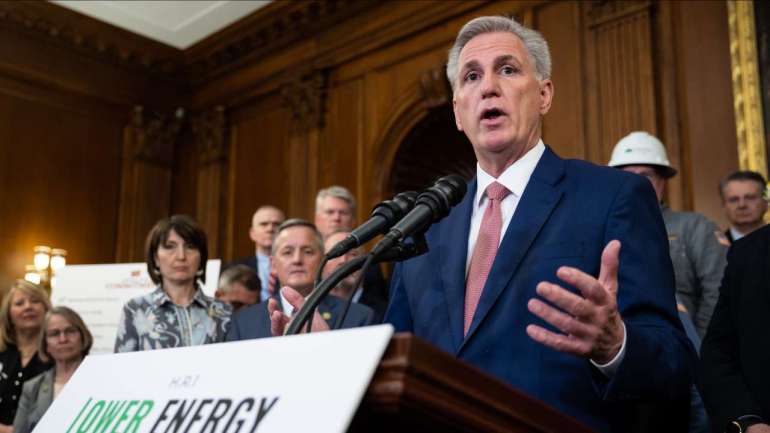House Republicans pass marquee energy bill in rebuke of Biden

“We just found that a majority of [Democrats] are so extreme that they would rather stand with China and Russia than with the American energy worker,” McCarthy told reporters after the vote. “I am not sure what’s controversial in the bill. I am not sure what’s controversial that you can speed the process up so you can make things in America.”
Democrats Henry Cuellar and Vicente Gonzalez, who hail from oil and gas producing Texas, voted for the bill, along with Marie Gluesenkamp Perez of Washington and Jared Golden of Maine, while Republican Brian Fitzpatrick voted against it.
Biden has vowed to veto the bill, known as the Lower Energy Costs Act. But elements of the bill, aimed at streamlining permitting rules for energy projects, could serve as the starting point for negotiations on that narrower issue with the Senate, where centrist West Virginia Democrat Joe Manchin last year pushed his own plan to ease those regulations.
Republicans designed the bill to do two things at once.
First, they sought to deliver a blow against Biden by repealing provisions of Democrats’ Inflation Reduction Act, such as the $27 billion Greenhouse Gas Reduction Fund to boost clean energy and a fee imposed on oil and gas methane emissions.
Republicans contend that the president is recklessly pushing a quick transition away from coal, oil and natural gas toward green-energy sources that China dominates, which would increase dependence on Beijing and other adversaries. The energy bill seeks to address some core Republican energy priorities from the past decade, from disapproving of Biden’s block on the Keystone XL pipeline to mandating more oil and gas lease sales and making it harder for states to block the construction of interstate pipelines that cross their borders.
But the House GOP also sought for the bill to represent an opening bid on the wonky issue of energy permitting — a rare policy area that both parties believe could lead to a bipartisan deal later on with the Senate.
“By showing our strong support, we give some of our Senate Democratic friends an idea of okay, we have a place to work the permitting space particularly,” said Rep. Kelly Armstrong (R-N.D.), a member of the House Energy and Commerce Committee. “Even if it’s not the whole package, these are smart policies whether you are trying to hook up offshore wind or trying to get a gas pipeline from North Dakota to Illinois.”
The GOP bill would overhaul rules for reviews conducted under the bedrock 1970 National Environmental Policy Act for energy infrastructure, ranging from pipelines to clean energy projects and mines, by setting a two-year deadline for major reviews and making it more difficult for environmentalists to sue to stop projects.
But most Democrats and the White House dismissed the Republican bill as doubling down on fossil fuel-centric policies that would benefit global rivals by keeping the U.S. out of the race to compete in industries of the future like electric vehicle manufacturing and clean energy development.
“None of it [the GOP energy agenda] makes sense in this moment,” said Rep. Kathy Castor (D-Fla.), a member of the Energy and Commerce Committee. “They ignore the fact it was the high fossil fuel prices that was the primary driver of inflation. What I hear from folks back home is they don’t want to be at the mercy of these gas and oil price spikes. They are looking towards the clean energy economy — greater independence and more money in their pocket.”
In its statement of administration policy opposing the bill, the White House noted that both domestic oil and gas production are set to reach record highs this year as companies have responded to last year’s high prices to bring more supply to the market. Gasoline prices have come down from record highs since the aftermath of Russia’s invasion of Ukraine last year but they could be set to rise again this summer during peak driving season.
Republicans, though, counter that their agenda makes more sense in the current moment since Russia’s military aggression underscored the importance of maintaining ample supplies of oil and gas even as the world transitions off fossil fuels.
“It comes down to affordability, it comes down to cleanliness, and it comes down to security,” said Rep. Garret Graves (R-La.), who wrote many of the major permitting parts of the bill. “This administration has caused so many problems with their energy strategy, our solution fixes a lot of the problems.”